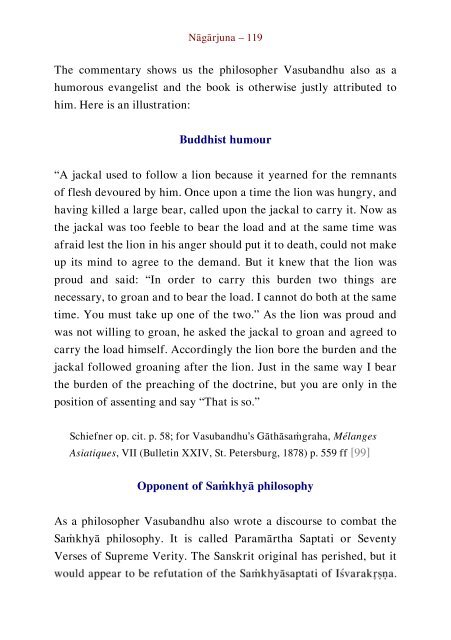Literary History of Sanskrit Buddhism
A study by J. K. Nariman of Sanskrit Buddhism from the Early Buddhist Tradition up to the Mahayana texts proper.
A study by J. K. Nariman of Sanskrit Buddhism from the Early Buddhist Tradition up to the Mahayana texts proper.
Create successful ePaper yourself
Turn your PDF publications into a flip-book with our unique Google optimized e-Paper software.
Nāgārjuna – 119<br />
The commentary shows us the philosopher Vasubandhu also as a<br />
humorous evangelist and the book is otherwise justly attributed to<br />
him. Here is an illustration:<br />
Buddhist humour<br />
“A jackal used to follow a lion because it yearned for the remnants<br />
<strong>of</strong> flesh devoured by him. Once upon a time the lion was hungry, and<br />
having killed a large bear, called upon the jackal to carry it. Now as<br />
the jackal was too feeble to bear the load and at the same time was<br />
afraid lest the lion in his anger should put it to death, could not make<br />
up its mind to agree to the demand. But it knew that the lion was<br />
proud and said: “In order to carry this burden two things are<br />
necessary, to groan and to bear the load. I cannot do both at the same<br />
time. You must take up one <strong>of</strong> the two.” As the lion was proud and<br />
was not willing to groan, he asked the jackal to groan and agreed to<br />
carry the load himself. Accordingly the lion bore the burden and the<br />
jackal followed groaning after the lion. Just in the same way I bear<br />
the burden <strong>of</strong> the preaching <strong>of</strong> the doctrine, but you are only in the<br />
position <strong>of</strong> assenting and say “That is so.”<br />
Schiefner op. cit. p. 58; for Vasubandhu’s Gāthāsaṁgraha, Mélanges<br />
Asiatiques, VII (Bulletin XXIV, St. Petersburg, 1878) p. 559 ff [99]<br />
Opponent <strong>of</strong> Saṁkhyā philosophy<br />
As a philosopher Vasubandhu also wrote a discourse to combat the<br />
Saṁkhyā philosophy. It is called Paramārtha Saptati or Seventy<br />
Verses <strong>of</strong> Supreme Verity. The <strong>Sanskrit</strong> original has perished, but it


















